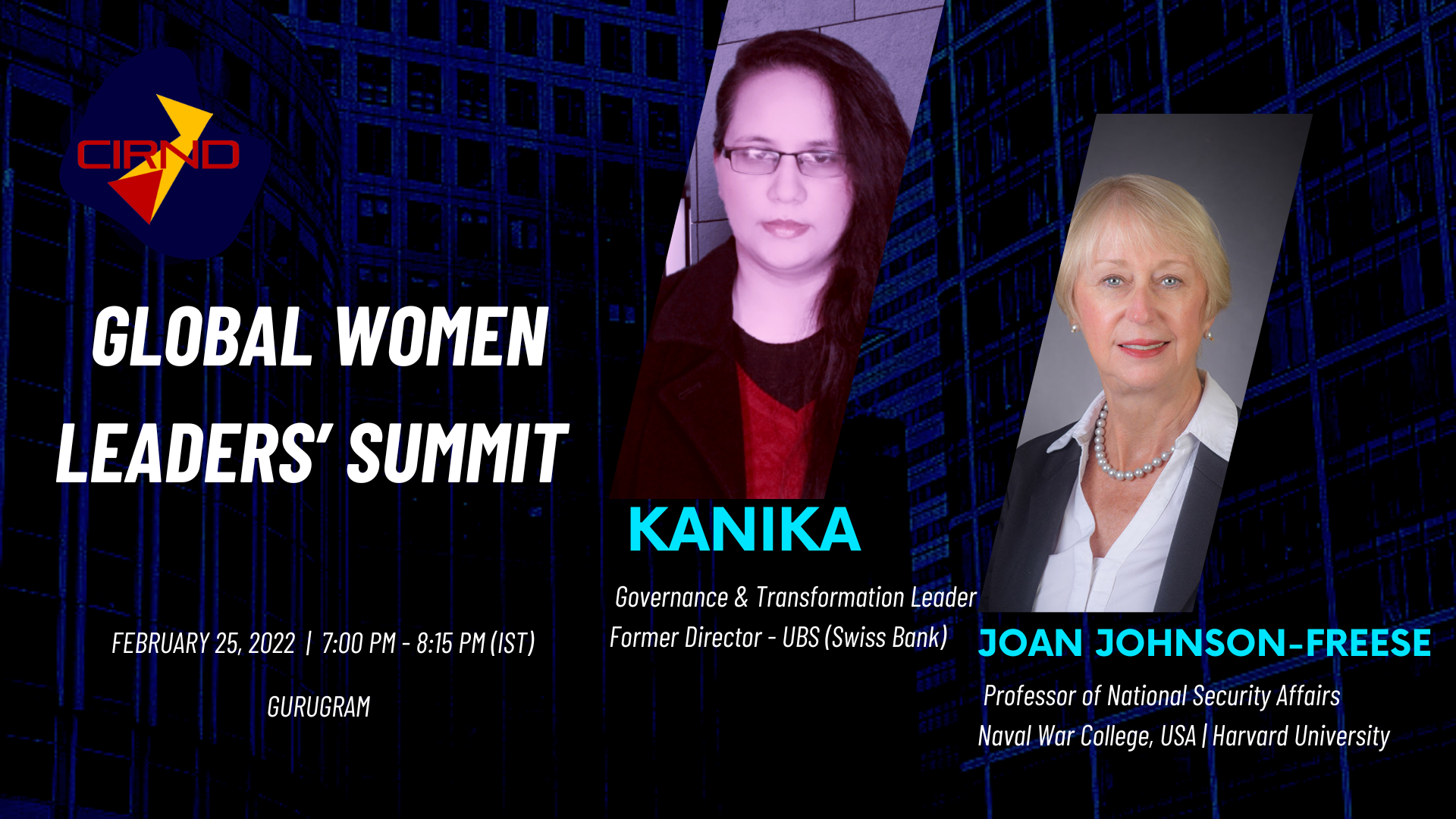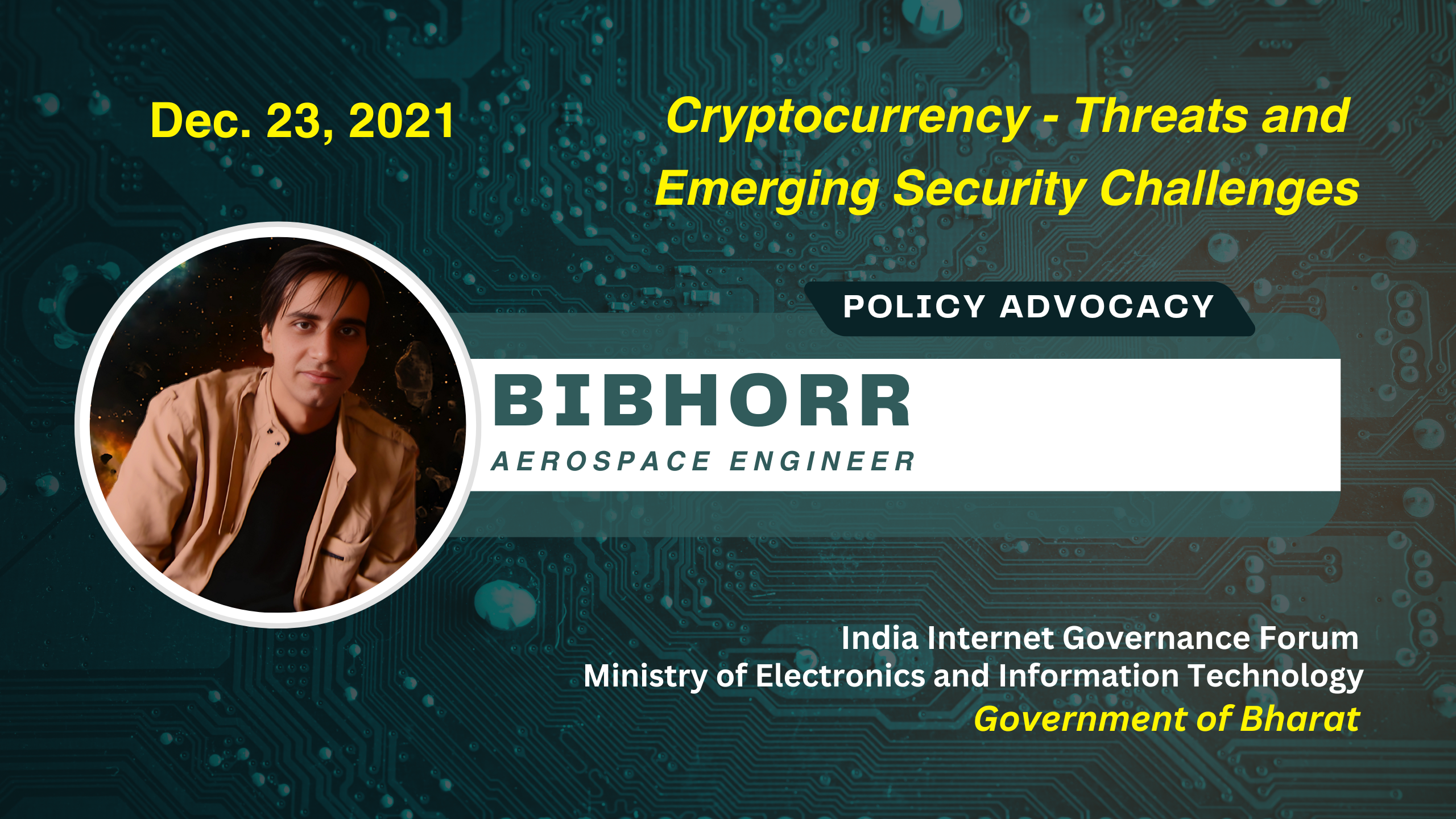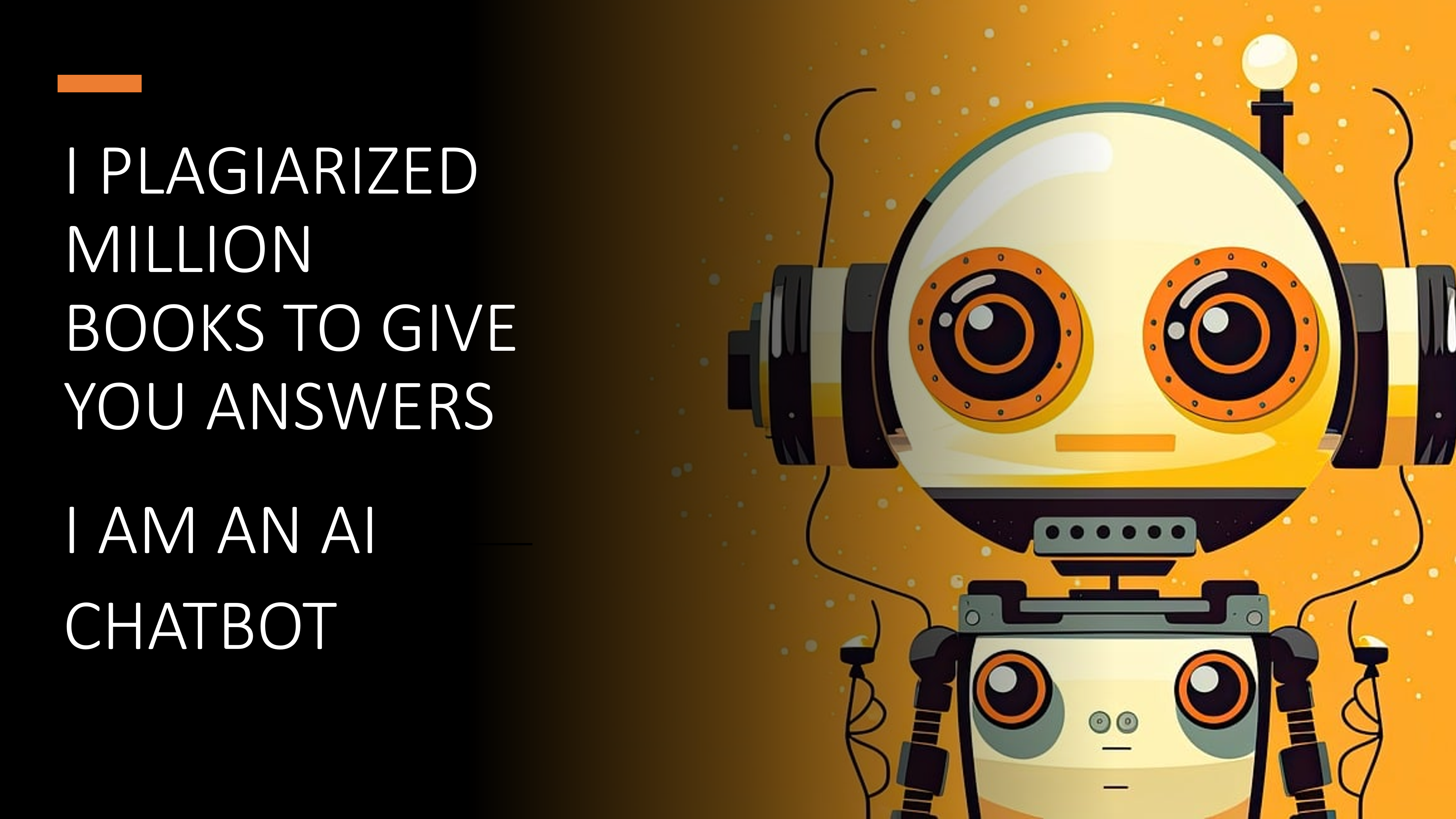Gurugram – The CIRND Federation hosted Global Women Leadership Summit on February 25, 2022. The event, which was sponsored by BIBHORR & PARTNERS, kicked off with an introductory address from the host Chirag, who is a strategy expert, policy advisor and an alumnus of IIM. In his introductory address, he introduced the eminent speakers to the participants and also apprized the vision behind the summit.
Kanika, Former Director of Union Bank of Switzerland, a Corporate Leader, Chairperson & Chief Mentor of Global Change Force Women Forum and Joan Johnson-Freese, Professor of National Security at Naval War College and Harvard University were the two eminent speakers who represented chief expertise from their respective areas.
Kanika’s address included insights on ‘unconscious gender bias’, that prevails both at workplace and otherwise. She shared her corporate experiences with some great real-life examples and further shared strategies to eliminate gender inequality. The participants found her session very engaging and her strategies very effective. Participants highly appreciated her address.
An interesting QnA session was hosted by Chirag. Following are some of the excerpts from it.
Host: What is this unconscious bias that you are talking about? And how do you see it in the corporate world with special incidents from the banking sector where you spent most of your career?
Kanika: Unconscious bias is basically a kind of prejudice that a person holds against someone / something unconsciously – meaning that they are not even aware of the fact that they hold such prejudice. It is the result of cognition and cognitive behavior. There are certain patterns that one adapts along one’s journey of life – these are taken up as part of the culture, belief, surroundings, what one hears, what one is taught, the company one keeps etc.
And this is a process that develops over time. While unconscious bias has several types, we are talking about ‘unconscious gender bias’ today – and this is the bias that occurs when someone unconsciously associates certain stereotypes with different genders.
There are several incidents w.r.t unconscious gender bias that we still witness across industries -particularly talking from the banking world (globally), while the situation has improved quite a lot from what it was a few years back, we still have a lot to do there. Incidents here, pertain to the several facets – however, I will cover a few most common ones –First and foremost being recruitment:
When recruitment panel and hiring manager favors a male candidate over an equally qualified and equally experienced female candidate, reasons they give generally include ‘she is too soft to manage a tough leader position, she is too timid to take up a senior role, she is not very outgoing’. And this is how an opportunity for a female candidate is lost -this is how roadblocks come in the way of women in their path to corporate ladder.
I have witnessed many of my male colleagues practicing this during recruitment process. I remember an incident that I would like to share, few years back, we had kept a women focused recruitment drive for a week -for some good strategic roles and during our internal conference while discussing the execution of the drive and how many candidates we would want from that drive, one of my male colleagues abruptly raised an objection stating that just because we are mandated to have diversity, why should I compromise so many male candidates against female candidates who can potentially be hired as a result of this drive! We were shocked to hear his perspective while otherwise he was very decent in conduct toward women.
So, this is what we are calling unconscious gender bias. Another area of concern is ‘compensation; Have clearly witnessed the pay gap when it comes to male–female pay packages and in some cases the gap is too huge to bridge even after salary corrections. This too needs to be changed. While this is prevalent in pockets. It does exist. I believe that Gender Equality is a moral right and indeed a business imperative.
Host: How do you think we can change this unconscious bias attitude in corporate world and what strategies you recommend to address gender inequality?
Kanika: In my view, we got to have extensive and frequent D&I interventions to identify how and when such biases come to fore – practical workshops and related interventions can actually make a difference. We need to figure out the ‘what’ and the ‘how’ and these interventions can help us identify those from a daily code of conduct – we need to identify these instances from the routine behavior. But the interventions alone won’t suffice, we need to put in more strategies in place.
We need to also look at processes holistically as well as internal processes and figure out through data analytics as to where all we need to make changes. These would be very specific data backed observations.
Innovation and AI models today have become cornerstones for a business to sustain the market requirements. However, have we used these to our advantage aptly? Yes, I am referring to using these tools & techniques for cultural shift too – for ensuring gender equality. I feel the AI tools are being underutilized when it comes to using them for addressing issues like gender inequality. Also, we need to standardize processes.
We need to remove subjectivity and emotion. Everything needs to be worked around fact and when I say facts, I mean as is and not what one perceives in mind.
Host: You are chairperson for GCF – Global Change Force Women Forum, what projects you intend to undertake as part of this initiative and how do you think it will benefit the members and other fellow women?
Kanika replied, “This concept and idea was born when I was once reflecting on my whole journey. I truly feel that everything good – all my accomplishments, achievements, success – is because of my mom. The entire credit of all my achievements goes to my mom. She gave me freedom and space to fulfil my dreams. Her sacrifices made me to chase my dreams. She is my inspiration and my ‘Guru’. And at every step, when you feel challenged, demotivated, depressed, you need a go-to person, someone you can speak your heart through. Hence, was born GCF.
We need to support each other. While a lot has to be done to get our male counterparts to come on the same page where there exists no bias, the starting point is ‘women supporting women’. We need to start from there, as that in itself can be a game changer. People have a perception that a woman envies another woman when it comes to competition, I don’t believe that.
In fact, my belief is that nothing is impossible if a woman starts supporting another woman. We need to elevate each other in our current roles which can actually go a long way. We are encouraging more and more memberships (for free) making GCF bigger with each passing day.
Host thanked Kanika and then gave a briefing about the other eminent speaker Joan Johnson-Freese.
Joan’s address included insights and views on Women, Peace and Security and what it entails. Joan kicked started enthusiastically mentioning that she whole-hearted agrees and supports every word that Kanika said. Joan further stated that we are taught from a very young age to compete and it puts us in a very bad situation.
Host : What exactly is Women, Peace and Security Framework?
Joan: Women, Peace and Security Framework that I have taught, that I have written about dates back to the year 2000 when UNSC (UN Security Council) resolution 1325 was passed at the United Nations with a very high vote of majority. And what is did for the first time codify the idea that gender is a factor in security. Gender inequality is not only a social issue but also a security issue. And I think part of what happens, this idea of gender equality is too often used as a bargaining chip.
It’s a good idea but when we deal with harder things we put it aside until later and what 1325 did was saying that women are active agents in security- gender inequality is a factor and again to reflect back to what Kanika said, it’s all based on data and not opinion. The WPS (Women, Peace and Security) framework has four pillars: Participation, Protection, Prevention and Relief & Recovery.
And what that means to take them one by one is we need more women involved in security-making decisions. And security is a very big word. One of the positive by-products of Covid has been more or less a global recognition that the role that woman plays in care-giving is not just a woman’s issues, they are family issues, they are corporate issues, they are security issues – so the idea of how we get more and more women involved as was pointed out, there are so many roadblocks at so many levels.
Protection (second pillar) acknowledges the reality that in many countries violence against women is very high. Even in countries where there are laws that protect women, situation is not that great. Women are penalty-free targets and violent crimes can be taken against them.
The third pillar is ‘Prevention’ and what that does is, it acknowledges that when women are involved in security affairs, things go better and that all is based on data – if I give you some data points – Research by women in Valerie Hudson, Texas A&M University has shown that when gender equality is high, countries are more stable.
When there’s high level of gender inequality your country is twice as likely to be fragile; it is three and a half times likely to have an autocratic, corrupt and less effective government and 1.5 times likely to be unstable. It is shown that when women are involved in peace treaties’ negotiations, they get into the root cause of the issues – not because they have different sources of info but because women communicate differently, they will bring things up that will not be brought up usually by men.
The chance that when women are involved in peace treaties, the treaty will last longer than usual. And the fourth pillar ‘Relief and Recovery’ states that the areas that have stricken by violence, when efforts are initiated, it should be acknowledged that efforts affect men, women, boys and girls differently.
These four pillars , sometimes are hard to remember so I summarize in two categories – One that we call ‘Inclusive Diversity’ – what that means is going back to what Kanika said, having more women involved and having them involved in the ways where they feel supported and free to speak up.
And the second category is what I call ‘consideration of gender perspectives’ – that is again a recognition that policies and programs affect people differently- for example in the US, more women die due to car accidents than men, not because we are worse drivers, it’s because the crash dummies that are used to set safety standards, are built according to men body measurements and not per women and so they are affected and get hurt. WPS framework is a part of the gender equality movement but taken to a national and an international level towards a more stable security and a positive peace.
Host: How and why did you get involved in Women, Peace and Security?
Joan: It’s an interesting question –I’m an Academic and long arc of my career was spent in space security – literally missiles, rockets, outer space – a male-dominated field, and worked with US military as a teacher, another male dominated field. And about 10 years ago, I was invited for a Women, Peace and Security conference and I very arrogantly said no, I thought that I teach security and I am a woman, what will be there for me to learn.
And it wasn’t until about a year when I went and it literally changed the direction of my career because I felt it’s so important to understand the links between gender equality, gender inequality, stability and security. Things don’t just happen randomly, they are all a part of very biased, prejudiced male structured system.
It’s only recently that we have been able to get involved and again, going back to all of Kanika’s very insightful comments, there’s so much more to do – not just women working together but getting men to understand the benefits of gender equality. We have a term in the US that describes unconscious bias, we call it ‘blind fish’.
So, working on Women, Peace and Security has become my focus. I usually talk about it by asking how many know about it and irrespective of the numbers, it is only 10% that are aware of it. So, I find it as my role to spread awareness about it.
Host: UNSCR 1325 was passed in 2000. How is the implementation coming? And what are the challenges to implementation?
Joan: Implementation was left to the national level and that is to be done through what they call National Action Plan. This was to set a framework or a roadmap for countries to work towards gender equality, inclusion and security. As of now 22 years later about 81 countries have a national action plan but only a third of them have budgets attached to it and as we know, individuals, organizations and countries prioritize what they spend upon. UNSCR 1325 has got a lot of rhetorical support but unfortunately, not as much actual support. National Action Policy is only a first step.
In the US as of 2017, we actually have a law. The US was the first country to pass a law making implementation, the law of the land. It is been very slow-going though and there are many challenges – largely fallen into the Structural category and Cultural Category. Structural ones can be changed by policy and law. Many of the countries that have an action plan, put caveats to this. The cultural category includes making a cultural change – and that has the hardest thing to do.
Host: What’s the difference between WPS framework and ‘feminist foreign policy’, which we also hear about in relation to advancing gender equality? And how does this relate to the views expressed in your books on WPS?
Joan: I’m glad that you asked that question- there’s often confusion on what’s Women, Peace and Security and feminist female policy – they both stem from the same basis. They are both working towards the idea of positive peace. Peace is a very broad concept. Negative peace is that there’s no fighting but there aren’t conditions for development. Positive peace says that that’s no conflict but there are conditions that work towards political, academic, social development.
So, they both stem from that. The difference is where WPS (Women, Peace and Security) works on the four pillars, foreign feminist policy works on the Right, Representation, Resource and Reality. Foreign Feminist Policy was introduced through Sweden. Since then other countries have also announced that they would either support it or support aspects of it.
Foreign Feminist policy supporter sometimes argue against Women, Peace, and Security – is the idea of protection has sometimes given countries excuses for violence and in that, the example they often give is that America in Afghanistan said that it is sending troops to protect women and classic example is when the US left Afghanistan, the women who stood up and had done what the US had asked, were left very vulnerable.
There’s a new article by my teaching assistant at Harvard – which tells about Afghanistan as a case study and if WPS (Women, Peace and Security) principles were applied, things might have ended differently. And how these relate to my books, WPS is not known by many people so I wrote a book to use it in my Harvard class that simply introduces it as a subject for individuals who want to know about it at a broader level.
I found that if this is so logical and data-based, why there’s not much support for it and that goes back to the comment that women are taught from a very young age to compete not only with men but also women – so I write this book Women vs Women: A Case for Co-operation mentioning why is it so important to work together.
Host: What can individuals do to promote Women, Peace, and Security?
Joan: There are things that we all can do within our organizations – wherever you are, in academic, government, industry, press for data because so much of what we are doing is data-based. And that can be done in many instances to convince the skeptics. I’m sure many of the women who are listening, would have witnessed instances where they are dismissed saying that it’s just their opinion – the reality is – it’s not their / my opinion, it is all data backed.
So, stress for data, it’s so important. In meetings, support each other. Mentoring is so important, as Kanika also talked about, where women to women informal advice helps them with promotions. Competence, Confidence, and Mentoring are very important.
The host ended the Q&A by thanking both the elite speakers of the event and ended it by playing a short video that had an important message much in line with the views expressed by the speakers. The host also expressed gratitude to the participants with a promise to come up with yet another interesting event soon.
The summit got concluded successfully through continued interactions with the attendees. The summit brought new insights and strategic implementation strategies to the participants. The much-awaited women leadership event ended on a high note with a vote of thanks by the host to all the speakers and participants.



